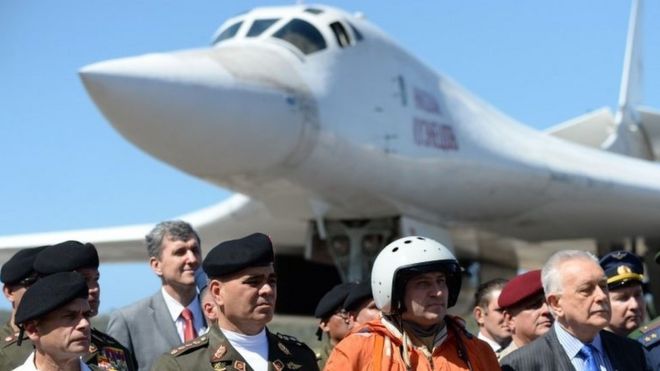US-Russian spat over bombers landing in Venezuela
 AFP
AFP
Russian and US officials have been involved in a spat over the landing in Venezuela of two Russian bombers capable of carrying nuclear weapons.
The two Tu-160 bombers landed in Venezuela on Monday in a Russian show of support for the government of socialist President Nicolás Maduro.
US Secretary of State Mike Pompeo said it amounted to "two corrupt governments squandering public funds".
The Russian government called his words "completely inappropriate".
The long-range strategic bombers landed at Simón Bolívar airport outside of the Venezuelan capital, Caracas, on Monday along with two other Russian planes.
Venezuela and Russia have long been close allies, and the Russian bombers - as well as a missile cruiser - were sent to the Latin American country in 2008.
The supersonic bombers also visited Venezuela in 2013.
The latest visit comes just days after President Maduro met Russian President Vladimir Putin in Moscow.
Venezuelan Defence Minister Vladimir Padrino said they were part of air force exercises with its Russian allies: "This we are going to do with our friends, because we have friends in the world who defend respectful, balanced relations."
You may also be interested in:
You may also be interested in:
- Russia and Venezuela agree debt deal
- Russia's Rosneft wins gas licences in Venezuela
- Venezuela crisis hits food markets and a morgue

"We are preparing to defend Venezuela to the last inch when necessary," the minister said in a reference to his government's frequent accusations that imperialist powers are trying to topple it.
President Maduro said on Sunday that there was an attempt under way "directly co-ordinated from the White House to disturb democratic life in Venezuela and to try to launch a coup d'etat against the constitutional, democratic and free government of our country".
Mr Pompeo denounced the deployment of the Russian bombers on Twitter.


Russian President Vladimir Putin's spokesman Dmitry Peskov said Mr Pompeo's comments were "very undiplomatic".
Mr Pompeo was not the only one to criticise the Russian move to send the bombers to Caracas.
US defence department spokesman Col Rob Manning noted the US recently deployed a navy hospital ship to Latin America to offer medical support to the millions of Venezuelans who have fled hyperinflation and shortages of goods and medicine in their home country since 2014.
"Contrast this with Russia, whose approach to the manmade disaster in Venezuela is to send bomber aircraft instead of humanitarian assistance," Col Manning said, according to NBC.
But Russia is not the only one sending its military jets to other countries. The US has also sent planes to its allies, including Ukraine, whose relations with Moscow remain tense following Russia's annexation of Crimea in 2014.

Tu (Tupolev)-160 bombers
 AFP/GETTY IMAGES
AFP/GETTY IMAGES- Known as White Swans in Russia (codenamed Blackjacks by Nato)
- Swing-wing aircraft with a maximum speed twice that of sound
- Fleet launched in 1981, modernised in 2000s
- Range: More than 12,000km (7,456 miles)
- Capable of carrying nuclear missiles
- Took part in Russia's Syria campaign, which began in 2015

No comments:
Post a Comment